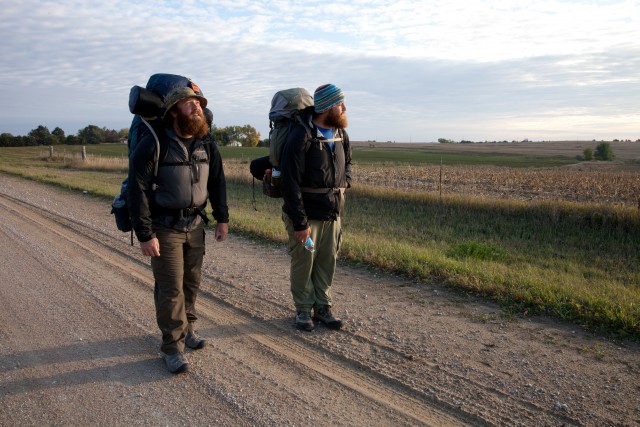
Anthony Anderson and Tom Voss go for a long walk to promote military veterans’ health issues in ALMOST SUNRISE
ALMOST SUNRISE (Michael Collins, 2016)
Saturday, June 11, 9:15, Film Society of Lincoln Center, Walter Reade Theater, 165 West 65th St. between Eighth Ave. & Broadway, 212-875-5050
Monday, June 13, 6:30, IFC Center, 323 Sixth Ave. at West Third St., 212-924-7771
Festival runs June 10-19
ff.hrw.org/new-york
sunrisedocumentary.com
 Michael Collins’s emotionally gripping documentary, Almost Sunrise, is built around an absolutely shocking statistic: According to the Department of Veteran Affairs, twenty-two U.S. veterans commit suicide every day. That’s one self-inflicted death every sixty-five minutes. In the film, two young veterans of Operation Iraqi Freedom, facing depression and suicidal thoughts themselves, decide to walk from their homes in Milwaukee, Wisconsin, to Los Angeles, California, in order to clear their own heads and raise awareness of this horrifying issue. Tom Voss and Anthony Anderson, a pair of big, bushy-haired men, became media darlings as they continued what became known as Veterans Trek, meeting with local press along the way and occasionally being joined by other veterans and supporters for parts of the 2,700-mile walk. But for much of the time, it’s just them against the elements, wandering across long stretches of deserted highways in the middle of nowhere, photographed beautifully by Clarissa de los Reyes. The two men intimately open up to Collins, who is with them every step of the pilgrimage; they share their thoughts about their families and speak dramatically about “moral injury,” a form of PTSD that the film describes as “a wound to the soul, caused by participation in events that violate one’s deeply held sense of right and wrong.” Similar distress is examined in Sonia Kenneback’s National Bird, in which military personnel working in the U.S. drone program try to deal with how they will never know the results of their classified operations, whether they hit the correct targets or whether they caused so-called collateral damage to innocent civilians.
Michael Collins’s emotionally gripping documentary, Almost Sunrise, is built around an absolutely shocking statistic: According to the Department of Veteran Affairs, twenty-two U.S. veterans commit suicide every day. That’s one self-inflicted death every sixty-five minutes. In the film, two young veterans of Operation Iraqi Freedom, facing depression and suicidal thoughts themselves, decide to walk from their homes in Milwaukee, Wisconsin, to Los Angeles, California, in order to clear their own heads and raise awareness of this horrifying issue. Tom Voss and Anthony Anderson, a pair of big, bushy-haired men, became media darlings as they continued what became known as Veterans Trek, meeting with local press along the way and occasionally being joined by other veterans and supporters for parts of the 2,700-mile walk. But for much of the time, it’s just them against the elements, wandering across long stretches of deserted highways in the middle of nowhere, photographed beautifully by Clarissa de los Reyes. The two men intimately open up to Collins, who is with them every step of the pilgrimage; they share their thoughts about their families and speak dramatically about “moral injury,” a form of PTSD that the film describes as “a wound to the soul, caused by participation in events that violate one’s deeply held sense of right and wrong.” Similar distress is examined in Sonia Kenneback’s National Bird, in which military personnel working in the U.S. drone program try to deal with how they will never know the results of their classified operations, whether they hit the correct targets or whether they caused so-called collateral damage to innocent civilians.
In Almost Sunrise, Emmett Cullen, a close friend of Voss’s who served alongside him in Iraq, explains, “After you see enough people getting hurt, and see other people get killed, you start to write yourself off in a way. You’re kind of resigned to the fact that you might as well just consider yourself already dead, and if you make it home, you’re lucky. ’Cause that’s the only real mental shift you can make to make it through those kinds of scenarios without kind of freaking out,” adding, “Mentally, you’re processing the situation you’re in, and the dangers, but you’re not feeling it. So that carries over to civilian life when you get out.” Both Voss and Anderson share their struggles with that transition, reaching deep inside themselves. The section near the end in which Voss turns to holistic breathing techniques feels tacked on, almost like an infomercial for that specific healing process, regardless of its success. But the rest of Almost Sunrise, which features a score by Adam Crystal and music by Yuka Honda and Nels Cline, is a sobering look at what soldiers go through in war and some of the profound psychological issues they have to face when they come home. Almost Sunrise is screening twice at the 2016 Human Rights Watch Film Festival, on June 11 at 9:15 at IFC Center and June 13 at 6:30 at the Walter Reade Theater, both followed by a Q&A with Collins, producer Marty Syjuco, Voss, and Anderson, with his wife, Holly.